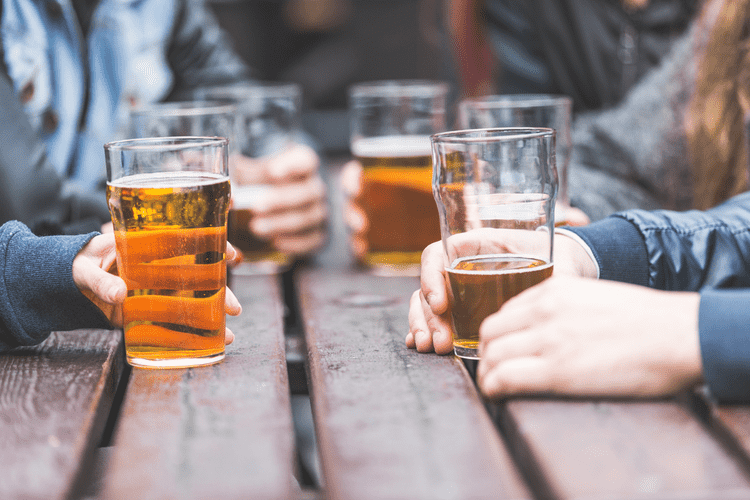Many people desire only to moderate use and bring it under control. In fact, there is growing support for what is called harm reduction, which values any moves toward reducing the destructive consequences of substance abuse. Researchers find that taking incremental steps to change behavior often motivates people to eventually choose abstinence. Nevertheless, https://echoplex.us/the-importance-of-a-healthy-diet-for-optimal-health/ many treatment programs, including Alcoholics Anonymous, require a commitment to complete abstinence as a condition of admission. Addictive behaviors have similar neurological and psychological processes and create rewarding feelings and sensations, so replacement addictive behaviors are common among those trying to overcome an addiction.
Tick season is expanding: Protect yourself against Lyme disease
Nevertheless, experts see relapse as an opportunity to learn from the experience about personal vulnerabilities and triggers, to develop a detailed relapse prevention plan, and to step up treatment and support activities. Not only is addiction relapse common, relapse is not considered a sign of failure. In fact, people in recovery might be better off if the term “relapse” were abandoned altogether and “recurrence” substituted, because it is more consistent with the process and less stigmatizing. Sustaining behavior change until new patterns become ingrained is difficult under the best of circumstances. In leaving addiction behind, most people have to restructure their everyday life, from what they think about and who they spend time with and where, to how they use their time, to developing and pursuing new goals. The shifts in thinking and behavior are critical because they lay the groundwork for changes in brain circuity that gradually help restore self-control and restore the capacity to respond to normal rewards.

© 2024 Harvard Health Publishing® of The President and Fellows of Harvard College
Still, others discover new sides to themselves during the quitting process (a greater capacity for compassion, for example). You can also talk to a doctor about medications that can help you cope with the symptoms of withdrawal. According to one model of behavior http://www.ecolora.ru/index.php/2010-07-09-03-51-16/yazyki/lietuvi-kai change known as the transtheoretical model, making any kind of change involves a process that starts with pre-contemplation and moves into contemplation. John C. Umhau, MD, MPH, CPE is board-certified in addiction medicine and preventative medicine.
- Our coaches will recommend specific articles, videos, and activities to help you thrive in recovery.
- But insurance doesn’t cover sweat ceremonies, so, until now, the department couldn’t afford to provide them.
- For many experts, the key components of addictive disorder are compulsive drug use that continues despite detrimental consequences, and the development of cravings with the inability to control use.
- Savage Sisters told the zoning board its stringent protocols prohibit the use of illegal substances at its recovery homes, and residents are required to take weekly drug tests.
- Still, some people in the addiction-treatment field reserve recovery to mean only the process of achieving remission and believe it is a lifelong enterprise of avoiding relapse.
What causes relapse?

Low-cost or state-sponsored treatment facilities are effective, but they often include few amenities and have long waiting lists. Luxury treatment centers provide high-end accommodations, but the bill for one of these centers is much larger than for a standard facility. Long-term recovery is not a final destination but rather an ongoing process of facing and coping with life without retreating into addictive http://muchmp3.ru/muzyka/rock-alternative/59561-blink-182-california-deluxe-edition-2017.html behaviors. It takes continuous commitment, which can waver at any time—particularly times of stress. You may have lost touch with old friends and loved ones, and changing your behavior may make it difficult to spend time around people who are still using substances or engaging in certain behaviors. But finding people who support your recovery can be very helpful and may improve your outcomes.
- 12-Step programs help people who are struggling with addiction.
- There are also hundreds of tribes that are excluded from the payments because they aren’t federally recognized.
- A shift toward a new positive identity occurs as they encounter themselves in a new light.
- Cravings are the intense desire for alcohol or drugs given formidable force by neural circuitry honed over time into single-minded pursuit of the outsize neurochemical reward such substances deliver.
There are coping strategies to be learned and skills to outwit cravings, and practicing them not only tames the impulse to resume substance use but also gives people pride and a positive new identity that hastens recovery. Stopping drug use is just one part of a long and complex recovery process. When people enter treatment, addiction has often caused serious consequences in their lives, possibly disrupting their health and how they function in their family lives, at work, and in the community. Research on the science of addiction and the treatment of substance use disorders has led to the development of research-based methods that help people to stop using drugs and resume productive lives, also known as being in recovery.

Lifelong Recovery
- Another is to carefully plan days so that they are filled with healthy, absorbing activities that give little time for rumination to run wild.
- The important feature is that the interest avert boredom and provide rewards that outweigh the desire to return to substance use.
- The Diagnostic and Statistical Manual of Mental Disorders (DSM) avoids the terms addiction and recovery.
- While new spiritual, therapeutic, or self-care practices have been added into their recovery plan, there may be resistance from self-help group members.